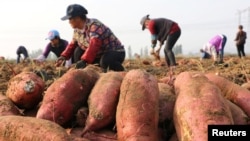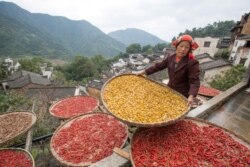China’s eastern province of Shandong has reversed a long-standing rule restricting movement from rural areas to the cities in an effort to boost urban consumption and close the social division between the province’s urban and rural dwellers.
Shandong’s move Thursday made it the second province to implement the change. The government in southern Jiangxi province announced on February 23 that people who have moved to cities from rural areas would be able to obtain household registrations with no restrictions.
“We will completely abolish settlement restrictions in urban areas,” Shandong’s announcement said. Previously, a person needed to have a legal residence and a legal job before being eligible to apply for a city living permit.
This is the first relaxation of China’s “hukou,” or residency permit, system since it was introduced in 1958.
Under the system, every citizen has a household registration record, which officially identifies the person as a permanent resident of a particular area. The record includes such information such as the person’s name, parents, spouse and date of birth.
Hukou defines entire lives: It determines where people can live, where they can work, what social benefits they are entitled to and where their children can go to school. Usually those with urban hukou enjoy far better resources than those with rural hukou.
Three functions
According to the consulting firm New Horizons, the three main functions of the hukou system are to control internal migration, manage the distribution of social resources and maintain stability.
The control of internal migration is the most important objective. The system limits where a person is allowed to live, especially if one is born into a rural hukou. Attempting to change to a more attractive residence or to an urban hukou can be extremely difficult. Thus, the system institutionalizes inequality.
“The hukou system was implemented as a tool for geographic, economic, political and social control resulting in an apartheid structure that denies farmers the same advantages and rights as those experienced by residents of the urban areas,” New Horizon said in an analysis.
Fei-Ling Wang, a professor of international affairs at Georgia Institute of Technology and the author of “Organization Through Division and Exclusion: China’s Hukou System,” told Sixth Tone, a state-owned English-language online magazine based in Shanghai, that the removal of settlement restrictions was “a bold step in the right direction to ease restrictions of labor mobility.”
“It is very much in line with the general trend of localization of the hukou administration, signaling a progressive relaxation of the control of domestic migration and a welcome effort of reducing the urban-rural barriers, at least within a province,” he said.
China’s urbanization rate stood at 60.6% at the end of 2019, according to China’s state-run Xinhua News Agency.
Economists say relaxing residency rules would help ease labor shortages in cities, and that an influx of rural workers will bring a boost in urban consumption, particularly through purchases of homes.
Yet some Jiangxi residents are skeptical of the policy change. Peng, a Jiangxi resident with rural hukou, told VOA that he’s not sure people like him can get the same social benefits even if he obtains an urban residency permit.
Concern about schooling
“My main concern is my kids’ education. School resources are never equal between people with rural hukou and urban hukou, and I’m not sure this policy change will give my kids the same resources if they have to go to a school here [in the city],” he told VOA.
A businessman who asked not to be identified for reasons of personal safety told VOA that scrapping residency rules is a good move, but only when those who move to an area have equal access to medicine, education and social benefits.
“Hukou is just a paper. The most important thing is your hukou can greatly impact your social benefits,” he said, “So we have to wait and see if farmers can really start to have equal rights and enjoy equal resources as their urban dwellers, should they choose to move to urban areas. And if not, this is just a show.”

